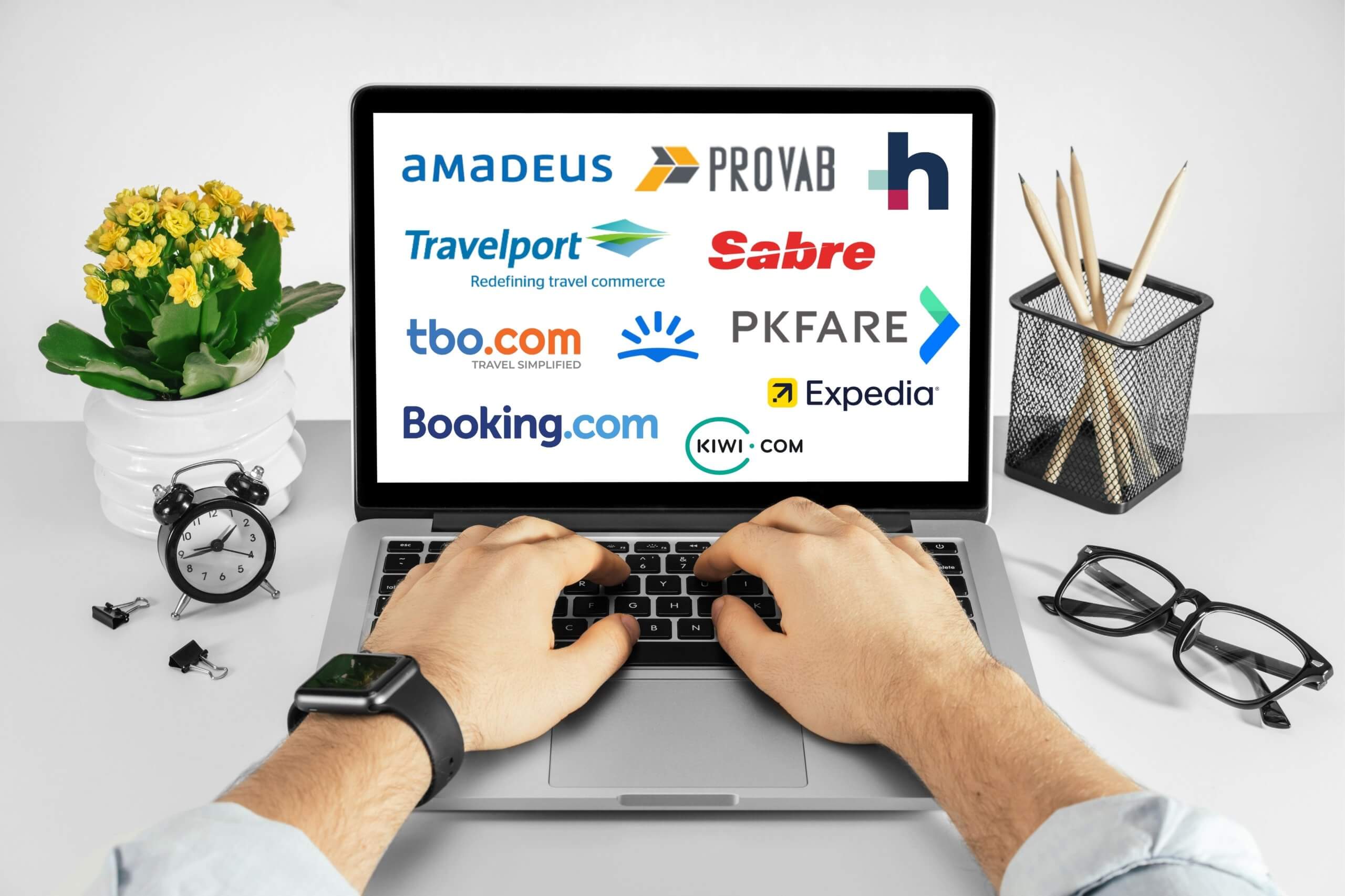Online Travel Agency Software: Features, tools & supplier secrets revealed

Learn how online travel agency software works, key features to look for, and top suppliers to launch your own travel platform successfully.
Online travel agency software (OTAs) has become an indispensable distribution channel in the travel and hospitality industry. According to a report from Expedia Group, these platforms account for 51% of global online bookings. With their marketing power and wide reach, OTAs help hotels difficultly improve their business efficiency to achieve independently.
However, cooperating with OTAs is not simply registering and waiting. You must closely manage information, room rates, and availability in real time. A proactive distribution strategy will help you seize opportunities and stay ahead of your competitors in the market.
When implemented correctly, online travel agency software also supports increasing direct bookings. The “billboard” effect helps increase brand awareness and drive customers to your website. Building a multi-channel distribution strategy is the key to maintaining a stable number of bookings.
Are you looking to build a professional online travel agency platform like Booking.com or Expedia? But don’t know where to start, how to connect booking systems, payments, and manage customer data? This article will help you understand the key features of online travel agency software, as well as introduce the leading reputable API solutions.
I. What is Online Travel Agency Software?
Online travel agency software is a comprehensive operational support tool for travel businesses. It integrates online booking, schedule management, CRM, accounting, and reporting features.
This technology helps automate booking flights, hotels, car rentals, and tours. Customers can look up prices and room availability in real time, assisting agents in saving time and improving user experience.
Additionally, the software also supports accurate financial tracking – from invoicing to cost management. As a result, businesses can easily control cash flow and minimize operational errors.
With the right software solution, travel agencies can operate more efficiently, serve customers better, and optimize profits. This technology platform helps travel businesses break through in the digital market.
II. How do OTAs work?
Around the 1990s, online travel agency software began to appear, opening a major turning point for the global tourism industry. Using the internet, these platforms gathered a series of services, such as airline tickets, hotels, tours, car rentals, etc., into one system, helping users easily book services by phone in just a few steps. They can plan their trips and reserve their airfare, accommodations, holiday packages, car rentals, and tours on their own rather than rely on a physical travel agent.
Are you familiar with names like Booking.com, Expedia, Airbnb or TripAdvisor? These platforms have gradually become the preferred choice for most global tourists. The obvious reason is that they offer a seamless experience – from searching for information and comparing prices to paying and providing post-trip feedback.
For accommodation establishments, such as hotels or homestays, connecting with multiple white-label travel software solutions at the same time using channel manager technology is very important. According to the latest report by Phocuswright in 2023, more than 50% of online bookings globally take place through online travel agency software. Channel managers help automatically update real-time room availability and prices from the hotel management system (PMS) to booking channels. Thanks to that, they avoid overbooking, optimize revenue, and improve operational efficiency.
III. What kinds of Software do Travel Agents use?
Running a travel agency is more than just booking tickets. Every day, they need to handle a series of tasks: scheduling, building tour programs, consulting customers, booking services, negotiating with suppliers, personalizing itineraries, and optimizing costs according to each customer’s budget.
Of course, no one does these things by hand or with Excel anymore. Today’s market has a lot of specialized software, often divided into 4 main groups:
- Travel booking software
- Tour & itinerary builder software
- Accounting software
- CRM and marketing software
Some “all-in-one” software can integrate many of the above functions, but in terms of depth, it is still difficult to replace specialized tools. Therefore, many agents often use a combination of solutions to meet their operational needs.

1. Travel booking software
Today, users can book flights, hotels, or tours in just a few minutes with various price comparison tools, cost predictions, or chatbot support. This poses a big challenge for agents: how do they stay in the role of experts instead of just being “intermediaries” searching?
Professional booking software is the answer. It automates the booking process and helps agents manage their back-office more effectively, from generating reports, issuing invoices, calculating commissions, and adjusting markup to connecting with accounting systems.
Some popular features:
- Booking engine: Book flights, hotels, tours, cars, etc. in just one platform
- Manage orders and payment status
- Calculate agent commissions
- Integrate online payment gateways
- Reports and statistics
When choosing software, agents should consider the number of APIs connecting to suppliers such as GDS (Global Distribution Systems), bedbanks, or local tour & activity (T&A) platforms. A system with wide coverage will help you serve customers better and avoid missing out on potential revenue sources.
2. Tour and itinerary building software
Your design is often the most time-consuming part. You need to plan, price, and book many services in advance – and ensure the itinerary is attractive enough, within budget, and meets your needs.
Tour builder software can support you effectively with features such as:
- Intuitive drag-and-drop interface
- Detailed data warehouse about hotels, restaurants, tour guides, etc.
- Illustrative photo library
- Pre-made tour templates
- Automatically export itineraries to PDF files or quickly share
This tool is not only for tour operators but also very useful for travel consultants, DMCs (Destination Management Companies), or agents organizing events and travel seminars.
3. Accounting Software
While many booking tools already include basic financial features, implementing a robust accounting system is essential if your agency processes a lot of transactions every day.
Some must-have features include:
- Create and send invoices
- Track and schedule payments
- Manage expenses and revenues
- Bank reconciliation
- Ensure PCI DSS compliance
- Financial reporting and analysis
4. CRM System
Do you know how customer relationship management (CRM) in the tourism industry differs from other sectors? Popular CRM software such as Zoho, HubSpot, or Salesforce are powerful but do not fully meet the specific needs of this industry.
The simple reason is that each industry has its customer approach and care characteristics, and tourism is no exception.
So, what features should a specialized CRM system for tourism have? Here are some important points you should note:
- Allocate potential customers reasonably to consultants, avoiding missing business opportunities.
- Group customers according to the tourism industry’s specific characteristics, helping personalize services better.
- Easily connect with tourism marketing channels such as booking sites and TripAdvisor. It helps expand customer reach.
- Send automatic notifications such as departure and arrival times, improving customer experience.
- It provides a customizable dashboard that makes it easy to track, manage, and visually evaluate marketing campaigns’ effectiveness.
Understanding these differences will help you choose the right CRM solution. At the same time, optimize business efficiency and retain customers longer.
IV. Must-have features to consider in Online Travel Agency Software
Building an online travel agency platform is not simply providing a web service for people to book. Behind a single click to book a hotel is a system of logic, integration, and experience. So, if you are developing software for a travel agency or want to understand more about online travel agency technology, what features should you have?
1. Online reservation and booking system
Have you ever had to open 4–5 tabs to find cheap tickets, then go back to find a hotel? With online travel agency softwares, your users want everything in one place: airfare, hotels, tours, and car rentals. Ideally, they can book immediately without leaving the application.
For example, Booking.com lets travelers book a room and suggests nearby attractions with reviews, maps, and real photos. If they are developing software for online travel agency softwares, they might ask yourself: Can users complete the entire journey in one session?
Ready to Outsource?
Discover how we can transform your business with expert IT solutions.
2. Quote management
Not everyone books a tour right away. Many customers want to shop around and compare options. Allowing agents to send quick quotes – customized to their needs – is a big plus. If your system supports real-time price updates and automatic quote generation, that adds even more value.
3. CRM tools
A customer who visited Thailand last summer may be interested in Bali or Maldives this year. CRM allows companies to easily track customer details, travel history, and previous bookings. These details make it easy to tailor marketing efforts and build stronger, more personal relationships with travelers.
4. Itinerary planning and creation
Many people travel on their way: some like to relax, and others want to explore cuisine. So why not let them arrange their schedule by dragging and dropping destinations, times, and activities? Planning travel itineraries doesn’t have to be complicated. With the right platform, businesses can easily access all trip details in one place, tailor plans to each customer, and check availability in real time.
Some tools even create ready-to-use, professional itineraries for you—saving time while keeping everything organized
5. Reporting and analytics
Do you know that user behavior changes with the seasons and trends? A modern online travel agency software needs a dashboard to see which months have many bookings, which tours are often canceled, and which destinations are hot. Not only for internal reporting but also as a basis for optimizing advertising campaigns, improving products, or forecasting bookings.
V. Top Travel Suppliers to start Online Travel Agency Software
You can build a beautiful interface and a smooth experience – but if the data about flights, hotels, and shuttles is incomplete or slow to update, users will leave after just a few clicks. This is where travel API providers become crucial to powering your platform.
Here are some names worth considering if you are developing online travel agency software and need a reliable, diverse, easy-to-integrate data source.

1. Amadeus API
Do you want to access global data about flights, hotels, cars, and tours? Amadeus is the almost default choice for large-scale online travel agency software. This is a GDS (Global Distribution System) used by many leading travel agencies worldwide. With over 25 years of experience, Amadeus processes many transactions daily and provides data from hundreds of airlines, hotel chains, and other travel services.
2. PROVAB API
Need an API that is easy to deploy but still powerful, supporting everything from flights to sightseeing? PROVAB is a name worth considering, especially for online travel agency software startups.
PROVAB’s API integrates data from both IATA and non-IATA consolidators – meaning you can access more diverse content without working with too many parties.
3. Travelport UAPI
Galileo is one of the most established GDS providers, widely used across markets such as India, the US, Europe, and Mexico. Whether you are building a booking system for agents or end customers, Travelport UAPI supports both models. Planning to serve a global market? This is definitely a solution worth considering.
4. Sabre API
Sabre offers access to a vast global network, including 400+ airlines, 200,000 hotels, and a wide range of suppliers across tours, cars, and trains. What makes Sabre special is that they have a network of more than 400,000 travel agents worldwide – this helps you reach a wider user base through the available network.
Sabre is suitable for online travel agency software that need a strong connection between buyers and sellers of global travel services.
5. TBO Holidays
TBO Holidays provides a large-scale travel booking platform, from hotel rooms to cruises, tours, and shuttles. If you are developing an online travel agency software targeting the outbound or inbound Asian market, TBO is a popular choice.
6. PKFare
PKFare integrates data from 600+ airlines and 400,000 hotels and uses machine learning to provide the best prices in real time. This is the right provider for online travel agency software businesses who love “smart” pricing algorithms and profit optimization.
Are you looking for a solution that helps you be flexible in pricing, diversify your services, and support multiple languages? PKFare is worth a try.
7. Hotelbeds API
Hotelbeds is a familiar name to those who have worked in the hotel booking industry. With 180,000 hotels in 185 countries, this is a huge “wholesale” warehouse for OTAs who want an advantage in price.
If you want to provide a hotel–tour–shuttle combo at a competitive price, Hotelbeds is a great choice.
8. Skyscanner API
From a simple ticket price comparison tool, Skyscanner now allows OTAs to integrate a powerful, easy-to-use flight ticket search API. This is a great choice for those who want to build an optimal flight ticket search system without connecting directly with many airlines.
9. Booking.com API
Do you want to integrate more than 29 million accommodations on your platform? Booking.com can be the key to unlocking that door. From 5-star hotel chains to homestays, guests can find everything – and you can get that content on your website.
However, you must follow a clear partnership policy and adhere to Booking.com’s branding.
10. Expedia API
Expedia is one of the biggest names in the global online travel agency software industry. With over 140,000 hotels and booking platforms in 75 countries, Expedia’s API provides fast responses and powerful data suitable for platforms that integrate hotels, flights, and cars.
11. Kiwi API
Kiwi is famous for combining non-alliance airlines to create optimal itineraries for both price and time. Their API is very friendly to startups or small OTAs who want to build a differentiated product.
VI. Why you should partner with Adamo Software for Online Travel Agency Software

Adamo Software has implemented more than 30 projects in the tourism industry – from developing custom booking portals and PMS systems to integrating APIs from leading providers such as Amadeus, Sabre, or Travelport. We have worked with international partners such as Airguides, Adventium, and PlanCare, providing flexible software solutions for each specific business model. You can check more detail in our portfolio.
Aside from stopping at technology, Adamo Software also supports customers in building effective distribution models and optimizing operational processes. At the same time, the online travel agency software we develop is completely independent, helping businesses reduce commission costs, control data, and easily expand when needed.
With more than 7 years of experience and 150+ successful projects, Adamo Software is a reliable partner to help your business accelerate your journey to digitize the tourism industry.





